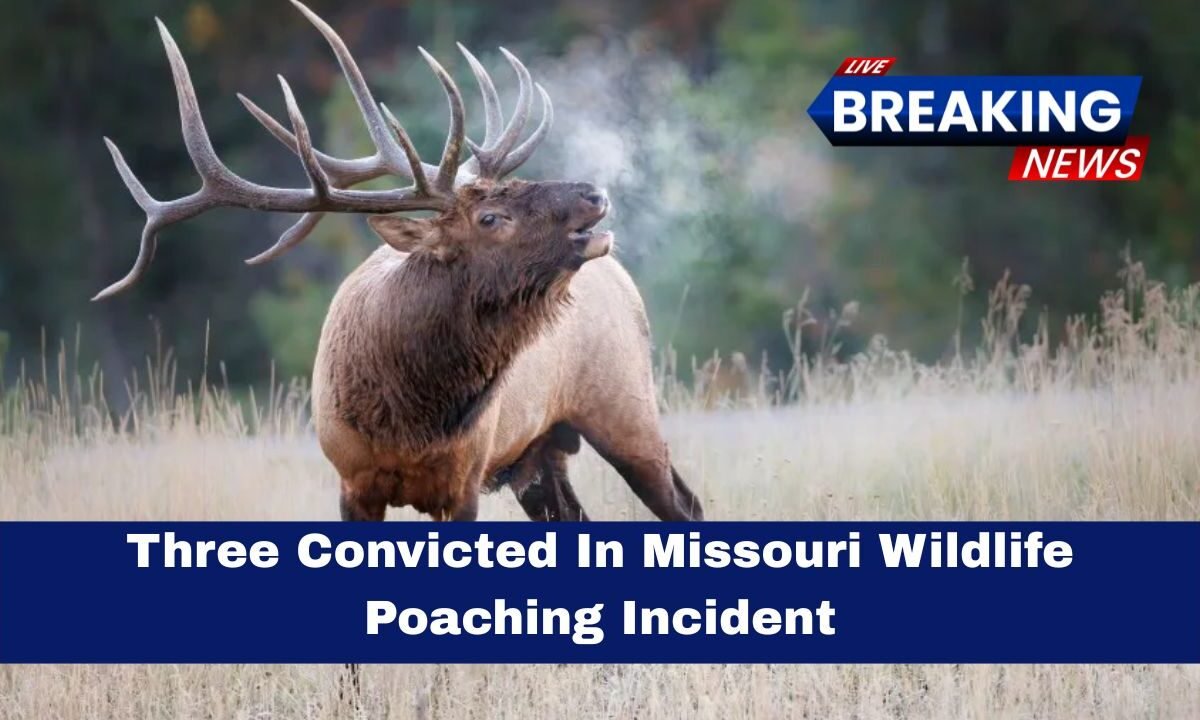A Missouri court has finalized sentencing for three men involved in the illegal poaching of a bull elk in Shannon County.
The case, which traces back to 2023, highlights the growing efforts of the Missouri Department of Conservation (MDC) to protect wildlife and punish illegal hunting activities.
Background of the Elk Poaching Case
The incident began when a bull elk was illegally killed and abandoned in Shannon County. The Missouri Department of Conservation launched an extensive investigation, which lasted several months and involved wildlife officers and local authorities.
The MDC later confirmed that three men were charged with multiple wildlife-related violations. These charges went beyond just elk poaching, including illegal possession of deer without proper Telecheck reporting.
The prosecutions were handled by the Shannon County Prosecuting Attorney’s Office, which pursued significant penalties to emphasize the seriousness of poaching crimes.
Details of the Sentencing
The court has now handed down punishments for the men involved. Here is a breakdown of the sentences and penalties:
| Name | Location | Charges | Sentence/Penalties |
|---|---|---|---|
| Michael K. O’Neail | De Soto, Missouri | Illegally killing and abandoning a bull elk | 60 days in jail (suspended), $10,000 fine, 2 years’ probation, fine to be paid within 1 year |
| Kevin B. Click | Bonne Terre, Missouri | Wildlife-related offenses, not directly responsible for killing elk | $500 fine, $750 mandatory contribution to Missouri Conservation Heritage Foundation |
| Travis R. Wadlow | Bonne Terre, Missouri | Wildlife-related offenses, not directly responsible for killing elk | $500 fine, $750 mandatory contribution to Missouri Conservation Heritage Foundation |
The stiffest punishment was given to O’Neail, who admitted to killing and abandoning the elk. While his 60-day jail sentence was suspended, he must successfully complete two years of probation and pay a $10,000 fine within one year.
Click and Wadlow received lighter penalties since they were not directly tied to the elk’s death. However, both were ordered to contribute to the Missouri Conservation Heritage Foundation, reinforcing the state’s message that all illegal hunting activity carries consequences.
Why Poaching Is a Serious Offense
According to MDC Protection Branch Chief Travis McLain, poaching is far from a victimless crime. He explained that:
- Lawful hunters contribute to conservation by paying license fees and following regulations.
- Poachers take resources illegally, harming wildlife populations and undermining conservation programs.
- The damage impacts not only wildlife but also the communities and outdoor enthusiasts who rely on healthy ecosystems.
Missouri’s elk population is still relatively small, having been reintroduced to the state in recent years. Each illegal killing poses a serious setback for conservation efforts.
Impact on Missouri’s Elk Restoration
The illegal killing of elk is particularly significant in Missouri because the elk population has been slowly rebuilding. These animals were reintroduced in 2011 after being wiped out more than a century ago. Today, the herd numbers only in the hundreds, mainly in the southern part of the state.
Protecting these animals is vital to ensuring that elk once again thrive in Missouri. Cases like this highlight the importance of conservation law enforcement and the consequences of illegal hunting.
What This Means for Hunters
This case sends a clear message: hunters must follow the law. Missouri provides opportunities for hunting, but only within legal limits. Hunters are required to:
- Properly Telecheck all deer or elk harvested.
- Hunt only during designated seasons with valid permits.
- Respect conservation laws that ensure wildlife populations remain sustainable.
Failure to follow these rules can result in steep fines, jail time, and long-term restrictions on hunting privileges.
The elk poaching case in Shannon County demonstrates Missouri’s commitment to protecting its wildlife. The court’s decision reflects the seriousness of the crime, particularly with the harsh penalty for O’Neail.
While Click and Wadlow faced lighter punishments, all three men were held accountable.
For the people of Missouri, this case is a reminder that poaching hurts everyone—from conservationists to lawful hunters and the broader public who value wildlife.
By enforcing strong penalties, the state aims to deter future violations and safeguard its fragile elk population for generations to come.
The message is clear: respect conservation laws, report wildlife crimes, and help protect Missouri’s natural resources.




